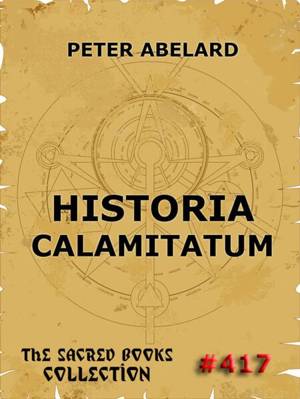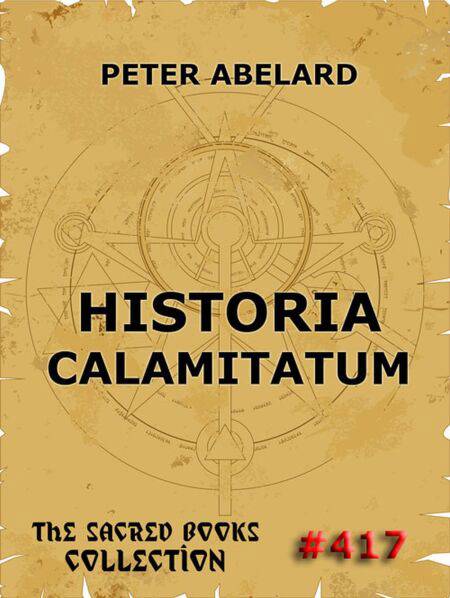
- Afhalen na 1 uur in een winkel met voorraad
- Gratis thuislevering in België vanaf € 30
- Ruim aanbod met 7 miljoen producten
- Afhalen na 1 uur in een winkel met voorraad
- Gratis thuislevering in België vanaf € 30
- Ruim aanbod met 7 miljoen producten
Zoeken
€ 1,49
+ 1 punten
Omschrijving
This edition includes a biographical sketch about the author.
Historia Calamitatum (A history of my calamities), also known as Abaelardi ad Amicum Suum Consolatoria, is an autobiographical work in Latin by Peter Abelard, one of medieval France's most important intellectuals and a pioneer of scholastic philosophy. It is one of the first autobiographical works in medieval Western Europe, written in the form of a letter. It is clearly influenced by Augustine of Hippo's Confessions. This extensive letter provides an honest self-analysis of Peter Abelard, who at that time was a pioneer of philosophy and university alike. The Historia Calimatatum provides readers with knowledge of his views of women, learning, monastic, life, Church and State combined, and the social milieu of the time. Within this important piece of literature, not only is one side of one of history's best-known love stories told, but integral parts of the history of the Middle Ages are revealed. It should be particularly noted that this book was written at a time when Western Europe had no intellectual endeavors but was just surfacing into the world of philosophy. The Historia is exceptionally readable, and presents a remarkably honest self-portrait of a man who could be arrogant and often felt persecuted. It provides a clear and fascinating picture of intellectual life in Paris before the formalization of the University, of the intellectual excitement of the period, of monastic life, and of his affair with Heloise, one of history's most famous love stories. Throughout this letter, it is greatly expressed how persecuted Abelard feels by his peers. He quotes saints, apostles, and at one point, compares his struggles in likeness to those of Christ. (from wikipedia.com)
Historia Calamitatum (A history of my calamities), also known as Abaelardi ad Amicum Suum Consolatoria, is an autobiographical work in Latin by Peter Abelard, one of medieval France's most important intellectuals and a pioneer of scholastic philosophy. It is one of the first autobiographical works in medieval Western Europe, written in the form of a letter. It is clearly influenced by Augustine of Hippo's Confessions. This extensive letter provides an honest self-analysis of Peter Abelard, who at that time was a pioneer of philosophy and university alike. The Historia Calimatatum provides readers with knowledge of his views of women, learning, monastic, life, Church and State combined, and the social milieu of the time. Within this important piece of literature, not only is one side of one of history's best-known love stories told, but integral parts of the history of the Middle Ages are revealed. It should be particularly noted that this book was written at a time when Western Europe had no intellectual endeavors but was just surfacing into the world of philosophy. The Historia is exceptionally readable, and presents a remarkably honest self-portrait of a man who could be arrogant and often felt persecuted. It provides a clear and fascinating picture of intellectual life in Paris before the formalization of the University, of the intellectual excitement of the period, of monastic life, and of his affair with Heloise, one of history's most famous love stories. Throughout this letter, it is greatly expressed how persecuted Abelard feels by his peers. He quotes saints, apostles, and at one point, compares his struggles in likeness to those of Christ. (from wikipedia.com)
Specificaties
Betrokkenen
- Auteur(s):
- Vertaler(s):
- Uitgeverij:
Inhoud
- Aantal bladzijden:
- 63
- Taal:
- Engels
Eigenschappen
- Productcode (EAN):
- 9783849623685
- Verschijningsdatum:
- 20/07/2012
- Uitvoering:
- E-book
- Beveiligd met:
- Digital watermarking
- Formaat:
- ePub

Alleen bij Standaard Boekhandel
+ 1 punten op je klantenkaart van Standaard Boekhandel
Beoordelingen
We publiceren alleen reviews die voldoen aan de voorwaarden voor reviews. Bekijk onze voorwaarden voor reviews.







